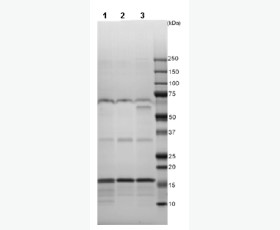Recombinant Human Lymphotoxin β R/LTBR/TNFRSF3/TNFRrp
| Product name: | Recombinant Human Lymphotoxin β R/LTBR/TNFRSF3/TNFRrp |
| Source: | Human Cells |
| Purity: | Greater than 95% as determined by reducing SDS-PAGE. |
| Buffer Formulation: | Lyophilized from a 0.2 μm filtered solution of 20mM PB,150mM NaCl,pH7.4. |
| Applications: | Applications:SDS-PAGE; WB; ELISA; IP. |
| Storage: | Avoid repeated freeze/thaw cycles. Store at 2-8 oC for one month. Aliquot and store at -80 oC for 12 months. |
| UOM: | 100ug/50ug/200ug/1mg/1g |
| Source | Human Cells |
| Description | Recombinant Human Lymphotoxin beta receptor is produced by our Mammalian expression system and the target gene encoding Gln31-Met227 is expressed with a Fc tag at the C-terminus. |
| Names | Tumor Necrosis Factor Receptor Superfamily Member 3, Lymphotoxin-Beta Receptor, Tumor Necrosis Factor C Receptor, Tumor Necrosis Factor Receptor 2-Related Protein, Tumor Necrosis Factor Receptor Type III, TNF-RIII, TNFR-III, LTBR, D12S370, TNFCR, TNFR3, TNFRSF3 |
| Accession # | P36941 |
| Formulation | Lyophilized from a 0.2 μm filtered solution of 20mM PB,150mM NaCl,pH7.4. |
| Shipping |
The product is shipped at ambient temperature. |
| Reconstitution |
Always centrifuge tubes before opening. Do not mix by vortex or pipetting. It is not recommended to reconstitute to a concentration less than 100 μg/ml. Dissolve the lyophilized protein in ddH2O. Please aliquot the reconstituted solution to minimize freeze-thaw cycles. |
| Storage |
Lyophilized protein should be stored at < -20°C, though stable at room temperature for 3 weeks. Reconstituted protein solution can be stored at 4-7°C for 2-7 days. Aliquots of reconstituted samples are stable at < -20°C for 3 months. |
| Purity |
Greater than 95% as determined by reducing SDS-PAGE. |
| Endotoxin | Less than 0.1 ng/µg (1 IEU/µg) as determined by LAL test. |
| Amino Acid Sequence |
QAVPPYASENQTCRDQEKEYYEPQHRICCSRCPPGTYVSAKCSRIRDTVCATCAENSYNEHWNYL TICQLCRPCDPVMGLEEIAPCTSKRKTQCRCQPGMFCAAWALECTHCELLSDCPPGTEAELKDEV GKGNNHCVPCKAGHFQNTSSPSARCQPHTRCENQGLVEAAPGTAQSDTTCKNPLEPLPPEMSGTM LMVDDIEGRMDEPKSCDKTHTCPPCPAPELLGGPSVFLFPPKPKDTLMISRTPEVTCVVVDVSHE DPEVKFNWYVDGVEVHNAKTKPREEQYNSTYRVVSVLTVLHQDWLNGKEYKCKVSNKALPAPIEK TISKAKGQPREPQVYTLPPSREEMTKNQVSLTCLVKGFYPSDIAVEWESNGQPENNYKTTPPVLD SDGSFFLYSKLTVDKSRWQQGNVFSCSVMHEALHNHYTQKSLSLSPGK
|
| Background | Tumor necrosis factor receptor superfamily member 3, also known as Lymphotoxin-beta receptor,Tumor necrosis factor C receptor,Tumor necrosis factor receptor 2-related protein,Tumor necrosis factor receptor type III,LTBR,TNFCR, TNFR3 and TNFRSF3, is a member of the tumor necrosis factor (TNF) family of receptors. LTBR is a single-pass type I membrane protein and contains four TNFR-Cys repeats. It is expressed on the surface of most cell types, but not on T and B lymphocytes. LTBR and its ligand play a role in the development and organization of lymphoid tissue and transformed cells. Activation of LTBR can trigger apoptosis. In addition, LTBR can lead to the release of the cytokine interleukin 8. |














